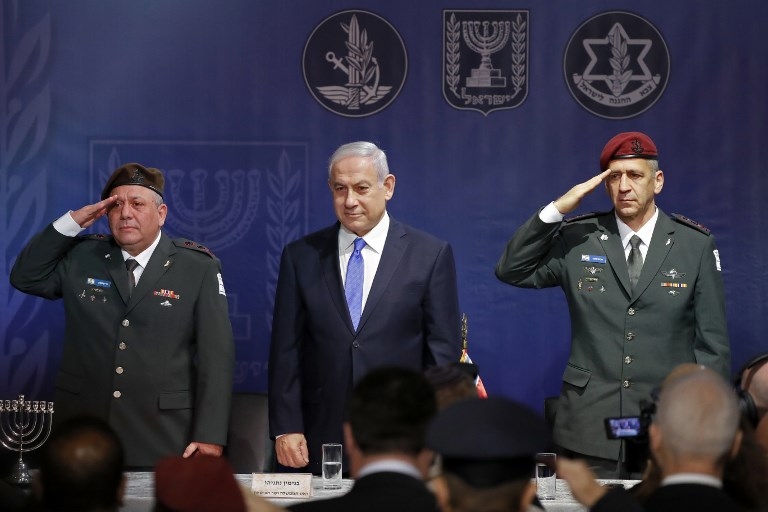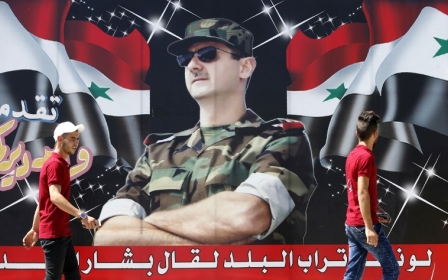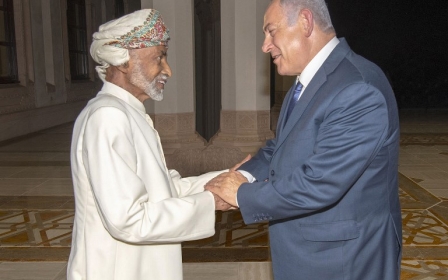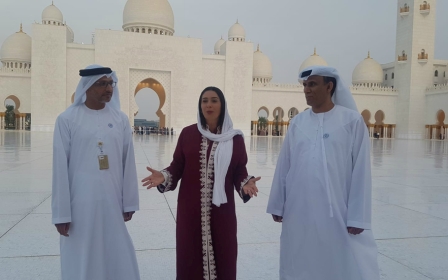Netanyahu hails 'hugs' between Arab and Israeli army commanders

Outgoing Israeli army chief of staff Gadi Eisenkot met the commanders-in-chief of several Arab armies during his four-year term, Israel's prime minister, Benjamin Netanyahu, said on Tuesday.
During a retirement celebration for Eisenkot, who has served as the 21st chief of the army's general staff since 2015, Netanyahu said that "Israel's ability in intelligence, military and technology made ties with the Arab world strong like never before", adding that "prominent Muslim states" were approaching Israel and seeing it "not as an enemy, but a supporter".
The prime minister credited the outgoing chief of staff for being part of the change in Muslim and Arab states' attitude vis-a-vis Israel.
"Gadi, you were part of it and you witnessed it, in your meetings with commanders-in-chief of armies of Arab states. You saw the hugs, and there are pictures of these hugs," Netanyahu said.
You saw the hugs, and there are pictures of these hugs
- Benjamin Netanyahu
Eisenkot's retirement celebration also saw the mantle passed on to his successor, Aviv Kochavi.
During 37 years in the military, Kochavi has commanded Israeli soldiers operating in the occupied West Bank, the Gaza Strip and Lebanon, and has headed the army’s operations and intelligence directorates.
Netanyahu's revelation about the "hugs" with Arab military leaders comes as Middle East Eye reported last week that Mossad director Yossi Cohen attended a meeting in a Gulf capital in early December with senior intelligence officials from the UAE, Saudi Arabia and Egypt, with whom he discussed measures to curtail the regional influence of Turkey and Iran.
MEE also reported last week that the leader of Israel’s Labor Party, Avi Gabbay, has secretly visited Abu Dhabi and met with senior UAE officials there in early December.
The UAE, like most Arab countries, does not have official diplomatic ties with Israel and does not officially recognise the state of Israel.
However, Israeli Minister of sport and culture Miri Regev travelled to the UAE in October to attend a judo tournament in which an Israeli competitor was allowed to compete under Israel's flag and sing its anthem for the first time in the UAE.
It was the first time an Israeli minister has made an official visit to the Emirates.
Netanyahu also visited Oman, which does not recognise Israel, in November, and was hosted in Muscat by Sultan Qaboos.
Among the Gulf states, Saudi Arabia, Oman and Bahrain are becoming more open about their relations with Israel at an official level.
Despite the warm official ties that Israel has developed with some Gulf Arab states, the 2017-2018 Arab Opinion Index poll conducted by the Doha Institute indicated that 90 percent of Arabs believe that Israel "poses a threat to the security and stability of the region".
During the ceremony, Kochavi was sworn in and promoted to lieutenant-general, the Israeli military’s highest rank.
New MEE newsletter: Jerusalem Dispatch
Sign up to get the latest insights and analysis on Israel-Palestine, alongside Turkey Unpacked and other MEE newsletters
Middle East Eye delivers independent and unrivalled coverage and analysis of the Middle East, North Africa and beyond. To learn more about republishing this content and the associated fees, please fill out this form. More about MEE can be found here.




